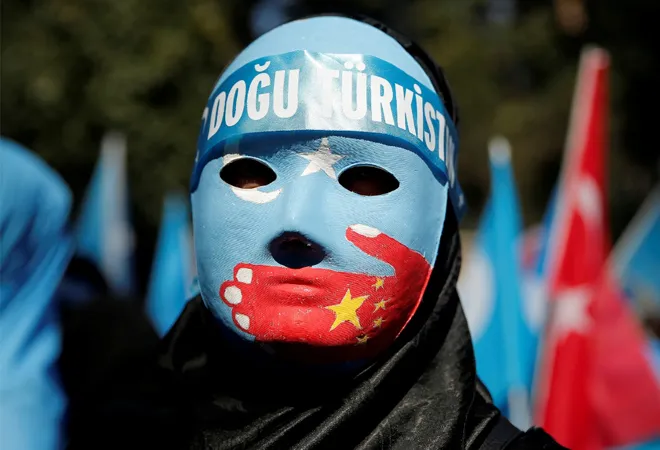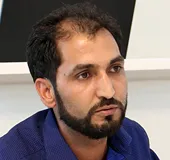
The Canadian Parliament on 1 February unanimously voted in favour of a proposal to
resettle 10,000 Uyghur Muslim refugees. The non-binding proposal introduced by Member of Parliament Sameer Zuberi got
all 322 votes of the House of Commons. The proposal came at a time when Beijing has increased intimidation and pressure on the Uyghur diaspora and exiles to return to the mainland through different means like
Chinese global police stations and increased cyber targets.
The Chinese colonial policies in its restive North-western province of Xinjiang forced many Uyghur Muslims to escape and relocate to other countries. Stateless, jobless, and separated from their loved ones, these Uyghur exiles have played a critical role in getting global attention on China’s genocide in Xinjiang. They have exposed Beijing’s colonial policies of forceful sinicization of Muslim minorities.
< style="color: #0069a6;">The Chinese colonial policies in its restive North-western province of Xinjiang forced many Uyghur Muslims to escape and relocate to other countries.
Realising the role of Uyghur exiles in exposing its atrocities on Muslim minorities in Xinjiang, President Xi Jinping-led Chinese Communist Party (CCP) has resorted to dubious and extrajudicial ways to increase the surveillance of the Uyghur exiles in foreign lands and to repatriate them forcefully.
< style="color: #163449;">China’s global police stations and Uyghur exiles:
China is not the first country to use covert and illegitimate means to monitor, harass, or repatriate its targets. Russia adopted the same strategy in England to kill its
former special officers. The
United States (US) did the same in Italy, where a former CIA official was jailed. Under Xi Jinping, Beijing has set up more than
100 police stations around the globe to monitor, arrest, harass, and repatriate citizens of Chinese origin, particularly Uyghurs—whom the CCP thinks are dangerous to China. Beijing has used its economic clout and bilateral security arrangements to set up joint policing, including in European countries such as Italy, Croatia, Romania ,and Serbia. China’s foreign affairs ministry, however, vehemently denied their existence and said that these outfits are
Chinese overseas service centres staffed by volunteers to help Chinese expatriates in mundane official formalities such as renewing driving licences. However, reports have increasingly blown the lid off such claims. The CCP has
hired undercover operators on contracts to run and manage these police stations. China has reportedly also used its economic heft over some countries where illegal Chinese police stations are active. Beijing has even signed joint police patrol agreements with some European countries to keep a vigil on the exiles. So far, CCP has been successful in harassing, arresting, and repatriating more than 2,000 Uyghurs from different countries, especially those where China is in a position to exert its economic might. Reports reveal
5,530 instances over the past two decades where the CCP threatened 22 such countries to arrest Uyghur exiles.
CCP’s colonial policies of cultural aggression against Muslim minorities of Xinjiang have gained more traction following the announcement of the much-hyped Belt and Road Initiative (BRI) by Xi Jinping. China’s oppression of Muslim minorities is not new, but under Xi, the cultural aggression scaled new heights. The CCP launched its
strike-hard campaign in Xinjiang “to sever the lineage and break the roots” of the Uyghurs. More than one million Muslim minorities, especially Uyghurs, were detained in concentration/detention camps and were subjected to physical and physiological torture under this renewed ethnic cleansing campaign.
Thousands of Uyghurs fled to Europe, the US, Turkey, Canada, and other parts of the world to escape China’s atrocities.
< style="color: #0069a6;">Under Xi Jinping, Beijing has set up more than 100 police stations around the globe to monitor, arrest, harass, and repatriate citizens of Chinese origin, particularly Uyghurs—whom the CCP thinks are dangerous to China.
Despite numerous problems encountered in foreign countries, the Uyghur exiles highlighted the miseries of their ethnic brethren in Xinjiang, who continued to face the CCP-led genocide, illegal organ harvesting,
rapes, torture, and sleep deprivation in detention camps. The self-exiled Uyghurs apprised the world of the grim situation via
press conferences and testified before democratic forums through
parliamentarians and global bodies. Beijing initially continued with its persistent denial but eventually accepted the presence of concentration camps under growing international pressure. The CCP officially labelled these concentration camps as “
vocational training centres” to end extremism and alleviate poverty within the restive Xinjiang province.
To keep the growing exposure of gross human rights violations under check, CCP used its worldwide “police stations” under the garb of citizen service centres to monitor, intimidate, arrest, and even repatriate Uyghurs. The Uyghur diaspora, in particular the stateless exiles, were subjected to a CCP-managed and operated
complex surveillance web.
The CCP also forced Uyghurs in some countries to spy on other exiles and the diaspora. In 2015
, Eysa Imin, a native of Korla city prefecture in Xinjiang, was arrested on his return from Malaysia and sent to a detention camp. Eysa Imin was released under one condition: He would work for Chinese security agencies at home and abroad to gather information about Uyghur exiles. When he managed to flee to Germany after a year or so, the CCP sent his family and relatives in Xinjiang to detention camps.
Yasinjan and his family moved to Turkey in 2016. They settled in the Zaytinburnu district, which has many Uyghur refugees and opened a barbershop. The CCP traced his whereabouts and tried to reach him via phone. When Yasinjin ignored the calls, the Chinese police imprisoned his relatives who had stayed back in Xinjiang. The CCP did not stop there. With Yasinjin refusing to give in to the threats and arm-twisting, the CCP used his mother living in Khotan as a bargaining tool and finally tried to trap him at his barbershop in January via an operative in one of its police stations in Turkey. China has mastered such terror tactics to collect information and create suspicion between the Uyghur exiles.
< style="color: #0069a6;">The self-exiled Uyghurs apprised the world of the grim situation via press conferences and testified before democratic forums through parliamentarians and global bodies.
Global democracies have taken a stance against these gross human rights violations and declared China’s atrocities of its minority Muslims of Xinjiang as genocide and a crime against humanity. Some countries also enacted laws prohibiting imports of goods linked to the Uyghur forced labour and sanctioned Chinese officials and companies. The US, for example, has imposed more than
100 Xinjiang-related sanctions against CCP officials, government agencies, and Chinese companies. However, when it comes to resettlement and humanitarian aid of stateless Uyghurs, Western democracies have rendered mere lip service. The Biden administration resettled 11,400 refugees in the US in 2021, but none of them was Uyghur. Against this backdrop, Canada’s resettlement of 10,000 Uyghur refugees sets and example for the US other developed democracies in the European Union to emulate. There is little hope for self-exiled vulnerable Uyghurs if China’s extrajudicial policing is allowed to mushroom to other parts of the world. Democratic regimes must continue to impose sanctions and show more sincerity in scrutinising, exposing, and punishing China’s genocide of its Muslim minorities. Their plight is no longer confined to Xinjiang. It has become a global concern.
The views expressed above belong to the author(s). ORF research and analyses now available on Telegram! Click here to access our curated content — blogs, longforms and interviews.



 The Canadian Parliament on 1 February unanimously voted in favour of a proposal to
The Canadian Parliament on 1 February unanimously voted in favour of a proposal to  PREV
PREV


